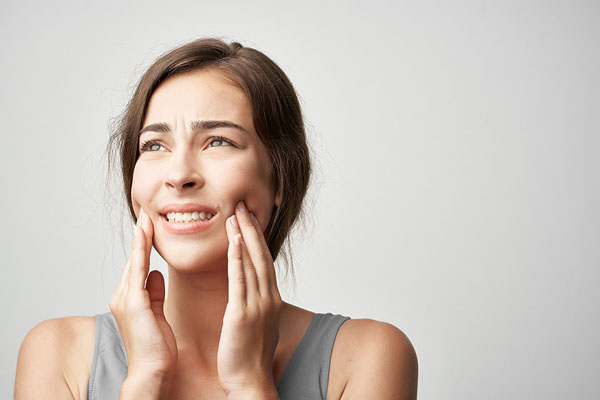The Link Between TMJ and Sleep Disorders
Temporomandibular joint disorders (TMD) and sleep apnea are two conditions that can impact your overall health and well-being. While they may seem unrelated, research highlights a strong connection between TMD and sleep apnea, showing that addressing one condition may improve symptoms of the other.
If you’re experiencing symptoms of TMJ pain or sleep apnea, our dentists in Wilmington and Seaford, DE, can provide personalized care. Call our Wilmington dental office at (302) 999-7600 or our Seaford dental office at (302) 536-7589 to schedule a consultation today.
What Is Sleep Apnea?
Sleep apnea is a sleep disorder characterized by repeated interruptions in breathing during sleep. These pauses disrupt sleep quality and can lead to serious health issues if left untreated.
There are two main types of sleep apnea:
- Obstructive Sleep Apnea (OSA): The most common form caused by the collapse of the airway due to relaxed throat muscles. This results in snoring, gasping, or abrupt awakenings.
- Central Sleep Apnea (CSA): Occurs when the brain fails to signal the muscles to breathe. Unlike OSA, CSA doesn’t involve a physical airway obstruction.
The Connection Between TMJ Disorders and Sleep Apnea
Recent studies reveal that nearly 40 percent of patients with TMJ disorders also experience sleep apnea. This relationship stems from how these conditions influence one another:
How TMJ Disorders Contribute to Sleep Apnea
TMD causes tension and discomfort in the jaw, neck, and surrounding muscles, potentially interfering with airway function during sleep. This may lead to loud snoring, shallow breathing, or obstructive sleep apnea symptoms.
How Sleep Apnea Aggravates TMJ Disorders
Sleep apnea often triggers teeth grinding (bruxism) and jaw clenching, which strain the TMJ. Over time, this can worsen TMJ symptoms, such as jaw pain, headaches, and facial discomfort.
Common Symptoms of TMJ Disorders and Sleep Apnea
Symptoms that may indicate a connection between TMD and sleep apnea include:
- Jaw Pain or TMJ Pain: Strain from teeth grinding or jaw clenching.
- Chronic Headaches: Often caused by poor oxygenation during sleep.
- Neck and Shoulder Pain: Linked to muscle tension associated with TMJ issues.
- Ear Pain or Discomfort: Pressure changes related to sleep apnea can also affect the TMJ.
- Limited Jaw Movement: Difficulty or pain when moving the jaw.
- Poor Sleep Quality: Frequent awakenings, daytime sleepiness, or difficulty concentrating.
Treatment Options for TMJ Disorders and Sleep Apnea
Treating these conditions often requires a multidisciplinary approach. Options include:
- Physical Therapy: Strengthens jaw muscles and reduces pain.
- Oral Appliances: Splints or mouth guards relieve pressure on the TMJ.
- Medications: Muscle relaxers or anti-inflammatory drugs.
Sleep Apnea Treatments:
- Continuous Positive Airway Pressure (CPAP): Maintains an open airway using a steady flow of air.
- Oral Appliance Therapy: Repositions the lower jaw forward to prevent airway collapse.
- Surgical Interventions: Removes obstructive tissue, such as tonsils or adenoids.
- Lifestyle Changes: Weight management, avoiding alcohol, and sleep position adjustments.
For some patients, addressing sleep apnea can also help alleviate TMJ symptoms. For instance, utilizing a CPAP device may decrease bruxism, ease TMJ pain, and enhance sleep quality. Additionally, incorporating stretching exercises into your routine can relieve tension and improve symptoms of both obstructive sleep apnea and temporomandibular joint disorders.

Frequently Asked Questions
If you experience symptoms like jaw pain, snoring, or frequent awakenings, consult a healthcare professional. A dentist, sleep specialist, or oral surgeon can diagnose your condition and recommend appropriate treatment.
Yes, addressing sleep apnea can reduce jaw tension and clenching, which often improves TMJ symptoms such as facial pain and headaches.
To alleviate temporomandibular joint discomfort and improve airway function, consider sleeping on your back with proper neck support. This position reduces stress on the jaw joints and aids in preventing airway obstruction. Avoid sleeping on your stomach, as it can intensify TMJ pain and exacerbate sleep apnea symptoms.
Take Control of Your Sleep and Jaw Health Today
Don’t let TMJ disorders or untreated sleep apnea disrupt your health and well-being. At our Wilmington and Seaford dental offices, Dr. Paul Brown and Dr. Chris Baran offer diagnoses and customized treatments to help you achieve a pain-free, restful night’s sleep.
Call us today at (302) 999-7600 (Wilmington) or (302) 536-7589 (Seaford) to schedule your consultation. We proudly serve patients in Wilmington, Seaford, and surrounding Delaware communities.


